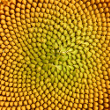What do sunflowers and pinecones have in common with rabbits? What do they all have to do with math? Watch this video from Scientific American’s Instant Egghead series and discover the answer!

Adult rabbits need more food than the younger rabbits.
Well Done! Partial Correct Answer Correct Answer Incorrect Answer
There is no rabbit mortality.
Well Done! Partial Correct Answer Correct Answer Incorrect Answer
Rabbits start breeding at the age of two months.
Well Done! Partial Correct Answer Correct Answer Incorrect Answer
The rate of reproduction for each pair of rabbits is constant.
Well Done! Partial Correct Answer Correct Answer Incorrect Answer
Is the number of clockwise spirals always greater than the number of counterclockwise spirals? It’s hard to tell from the video so check it out for yourself!
The golden angle is the complementary angle of another angle.
Well Done! Partial Correct Answer Correct Answer Incorrect Answer
The length of the arc of the circle that subtends the golden angle.
Well Done! Partial Correct Answer Correct Answer Incorrect Answer
The sector of a circle that subtends the golden angle.
Well Done! Partial Correct Answer Correct Answer Incorrect Answer
The supplemental central angle of the golden angle.
Well Done! Partial Correct Answer Correct Answer Incorrect Answer
In addition to greater efficiency, the golden angle creates an inflorescence with a more uniform floret spread than any other angle. Other angles create a pattern where most of the inflorescence area is empty. This is demonstrated in computer simulations, here: https://bit.ly/2Y0ecyQ.
They have a growth hormone-based biological mechanism.
Well Done! Partial Correct Answer Correct Answer Incorrect Answer
They have a pheromone-based chemical mechanism.
Well Done! Partial Correct Answer Correct Answer Incorrect Answer
They did all their geometry homework.
Well Done! Partial Correct Answer Correct Answer Incorrect Answer
They have a physical mechanism based on magnetic repulsion.
Well Done! Partial Correct Answer Correct Answer Incorrect Answer
This video presents the “rabbit problem,” which led to the development of the Fibonacci sequence and the golden ratio. It also shows the sequence in nature and explains why it appears in sunflowers and pine cones. In the activity, students will try to solve problems related to the Fibonacci sequence. Note that question 3 may not be suitable for junior high school students, as it includes the “central angle of a circle” term.
Sequence, general term, angle
Knowledge building